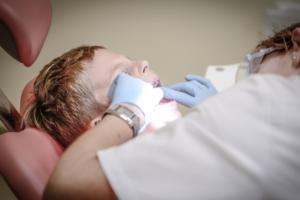On Fox News (9/23) radio, American Dental Association spokeswoman Dr. Mary Hayes
discusses the importance of baby teeth. “Baby teeth are the pattern for the permanent teeth,” says
Dr. Hayes, emphasizing parents start preventive dental care early. “Some kids who are going
through a phase when there’s more decay present, maybe they need to be on a different plan;
maybe they need to brush their teeth more often, maybe they need some supplements,” adds Dr.
Hayes.
 She recommends parents speak to their child’s dentist about “how and when to fill cavities and
She recommends parents speak to their child’s dentist about “how and when to fill cavities and
changes to prevent further decay.” Doctor Hayes also a spokesperson for the American Dental
Association, says it’s critical for parents to start prevention early. Brushing and flossing for them
and minimizing extra sugars.
MouthHealthy.org provides additional information for patients on how to care for a child’s
teeth on what you can do at home to start healthy habits:
• Begin cleaning your baby’s mouth during the first few days after birth by wiping the
gums with a clean, moist gauze pad or washcloth. As soon as teeth appear, decay can
occur. A baby’s front four teeth usually push through the gums at about 6 months of age,
although some children don’t have their first tooth until 12 or 14 months.
• Until you’re comfortable that your child can brush on his or her own, continue to brush
your child’s teeth twice a day with a child-size toothbrush and a pea-sized amount of
fluoride toothpaste. When your child has two teeth that touch, you should begin flossing
their teeth daily.
• For children younger than 3 years, caregivers should begin brushing children’s teeth as
soon as they begin to come into the mouth by using fluoride toothpaste in an amount no
more than a smear or the size of a grain of rice. Brush teeth thoroughly twice per day
(morning and night) or as directed by a dentist or physician. Supervise children’s
brushing to ensure that they use of the appropriate amount of toothpaste.
• For children 3 to 6 years of age, use a pea-sized amount of fluoride toothpaste. Brush
teeth thoroughly twice per day (morning and night) or as directed by a dentist or
physician. Supervise children’s brushing and remind them not to swallow the toothpaste.